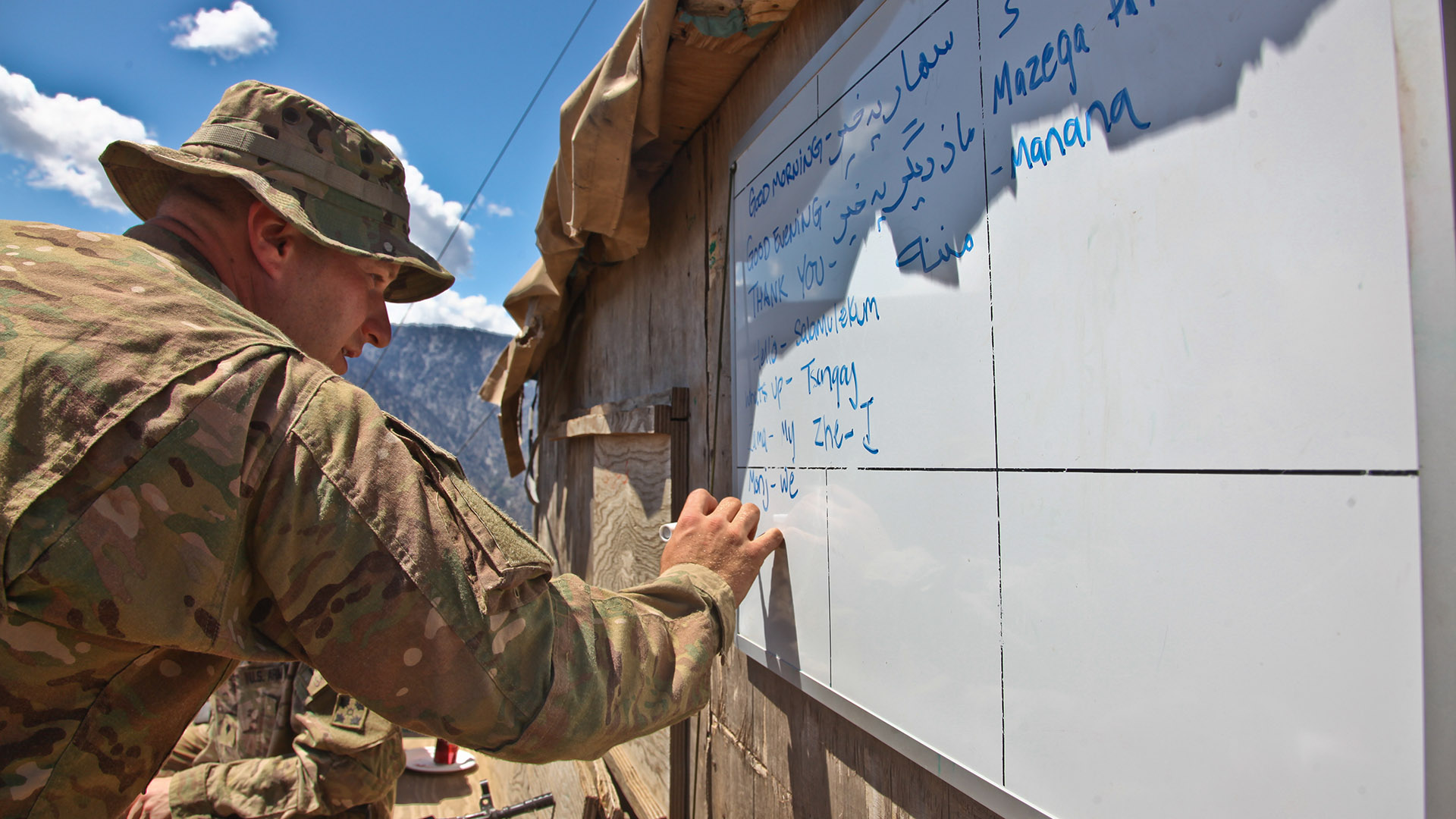

In a further sign that the U.S. military wants to forget that the Afghanistan War ever happened, the Defense Language Institute Foreign Language Center in Monterey, California will cease teaching Pashto to service members and civilians after November.
Pashto is one of Afghanistan’s national languages and is used for official communications by the Taliban, which has controlled the country since the chaotic U.S. withdrawal in August 2021.
The Monterey County Weekly newspaper in California and Connecting Vets have previously reported that the institute’s current class of Pashto speakers will be its last. Although the institute will help Pashto speakers maintain their language skills, it will not teach Pashto to new students.
Subscribe to Task & Purpose Today. Get the latest military news and culture in your inbox daily.
Steve Collins, chief of staff of the DLI FLC, confirmed to Task & Purpose that the institute will no longer teach Pasto as part of its basic acquisition language courses.
“The Department of Defense has shifted its foreign language training requirements to meet the needs within the National Defense Strategy,” Collins said. “In turn, the Defense Language Institute must also shift its training requirements to meet each of our service’s needs. There is no longer a need for a large number of Pashto linguists, and the current number in the force is sufficient for the requirement.”
The institute can also restart its Pashto program if needed, Collins said.

The U.S. military found that Pashto speakers were incredibly valuable during the 20-year war in Afghanistan. Former Defense Secretary Christopher Miller, who was among the first Special Forces troops deployed to Afghanistan after the Sept. 11, 2001 terrorist attacks, remembered how one Green Beret on his team spoke “exceptional Pashto.”
“He literally was worth his weight in gold,” Miller told Task & Purpose in an email. “An example to me of the brilliance of Army Special Forces.”
Even though that war is over, the U.S. military still needs Pashto speakers, said Jonathan Schroden, an Afghanistan expert with CNA, a nonprofit research and analysis organization in Arlington, Virginia.
“I’d say at a minimum it’s important because the US military continues to operate an ‘over-the-horizon’ counterterrorism capability focused on Afghanistan and it would behoove at least some members of that entity (e.g., its intelligence analysts) to speak Pashto,” Schroden told Task & Purpose.
The U.S. military may eventually have to conduct counterterrorism missions inside Afghanistan as well, said former Afghan Lt. Gen. Haibatullah Alizai, the last chief of staff of the Afghan National Army.
Even if no U.S. troops operate on the ground in Afghanistan, they will need to listen to radio transmissions and collect signals intelligence through other means, said Aliza.
“I think the U.S. should keep training the Pashto language in the training center as one of the important languages,” Alizai told Task & Purpose. “We also understand that today Afghanistan is not a security threat to the U.S., but no one can guarantee that in the next two, three or five years it will become another security threat.”
Pashto is incredibly difficult for native English speakers to learn and developing a cadre of troops who are competent in the language is a yearslong undertaking, said Jack McCain, a Navy Reserve officer who trained Afghan Black Hawk helicopter pilots.
“Having had some exposure to Pashto, I can attest to the exceeding difficulty of it,” McCain told Task & Purpose.

McCain was part of the Defense Department’s former Afghanistan-Pakistan Hands Program, which attempted to create a group ofU.S. service members with expertise in the region.
While it is unlikely that U.S. troops will return to Afghanistan in the foreseeable future, the country remains relevant to U.S. national security interests in part because it shares a border with China, McCain said. It is important for the U.S. military to continue to have Pashto speakers to understand the situation on the ground in Afghanistan.
“Getting rid of the [Pashto] program shows what I would characterize as a short-sightedness,” said McCain, who made clear he was only speaking on behalf of himself, not the Navy. “Afghanistan as a nation – and likely, as a future harbor of terrorism – is always going to be important to the United States, especially as we approach this mentality of what we call great power conflict.”
While it would be helpful for service members to learn Pashto, military language programs will continue to have limited value so long as the U.S government does not have a clear idea of what it hopes to accomplish in Afghanistan and other countries, said Tom Ricks, a former Washington Post reporter and Pulitzer Prize winner.
Indeed, the British political officers who administered the former empire knew they were part of a long-term mission, so they spoke several languages, learned the local culture, and knew local tribal and religious leaders, whom they dealt with for years – even decades, said Ricks, a former Task & Purpose writer.
“The United States pretended it was just there for a bit,” said Ricks, who lived in Afghanistan prior to the Soviet invasion in 1979. “When that pretense wore thin, it started the AfPak Hands program, but never took it seriously. Bottom line: We probably need people who speak these languages. But it won’t make much difference if we are not more thoughtful about what we are doing in these countries.”
The latest on Task & Purpose
- Is Ukraine winning the war against Russia?
- Air Force sends F-22s to Middle East to deter aggressive Russian pilots
- Army secretary concerned ‘woke military’ criticism could hurt the service
- Fort Sill commander fired amid investigation
- Fort Polk is renamed Fort Johnson